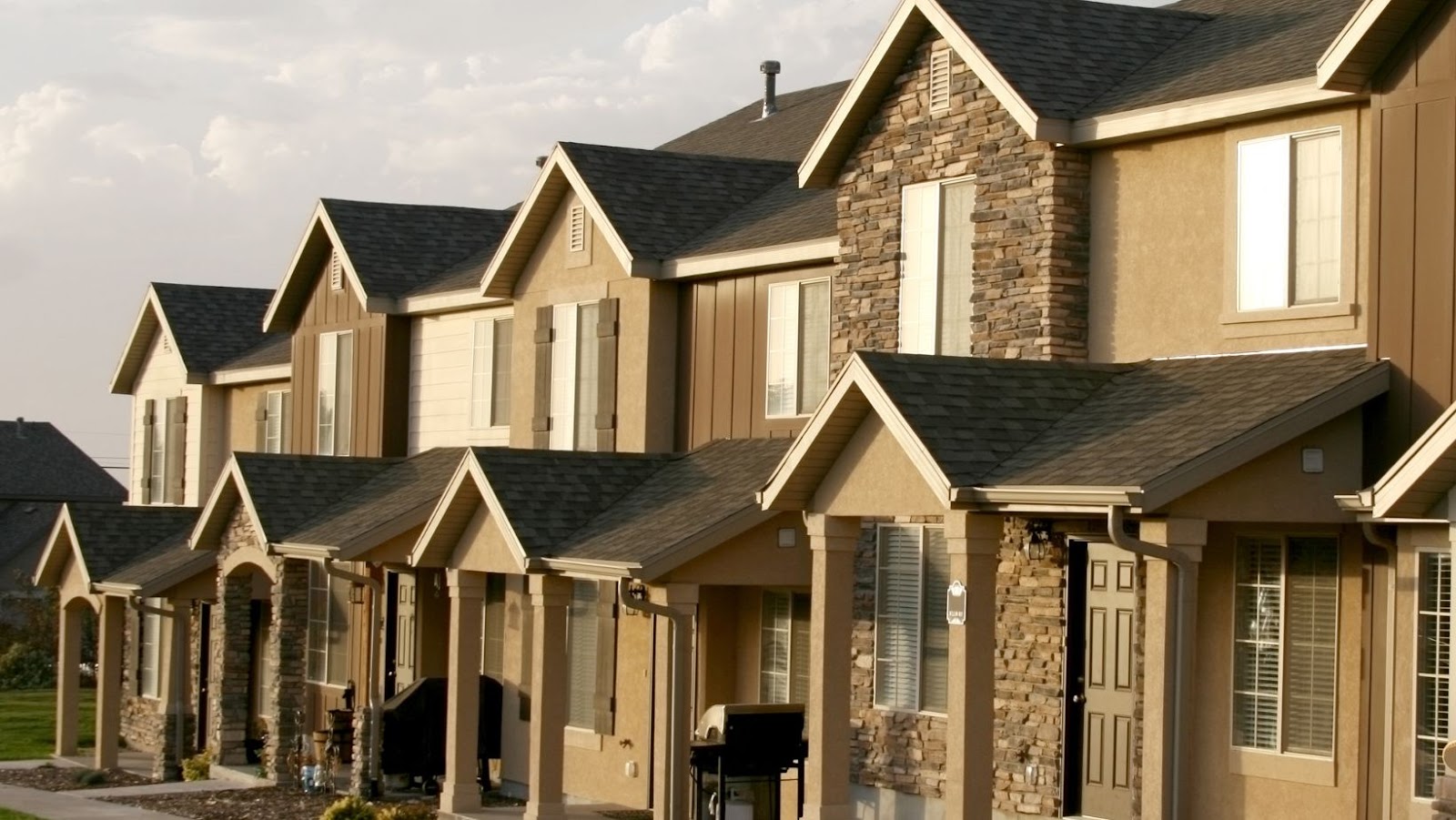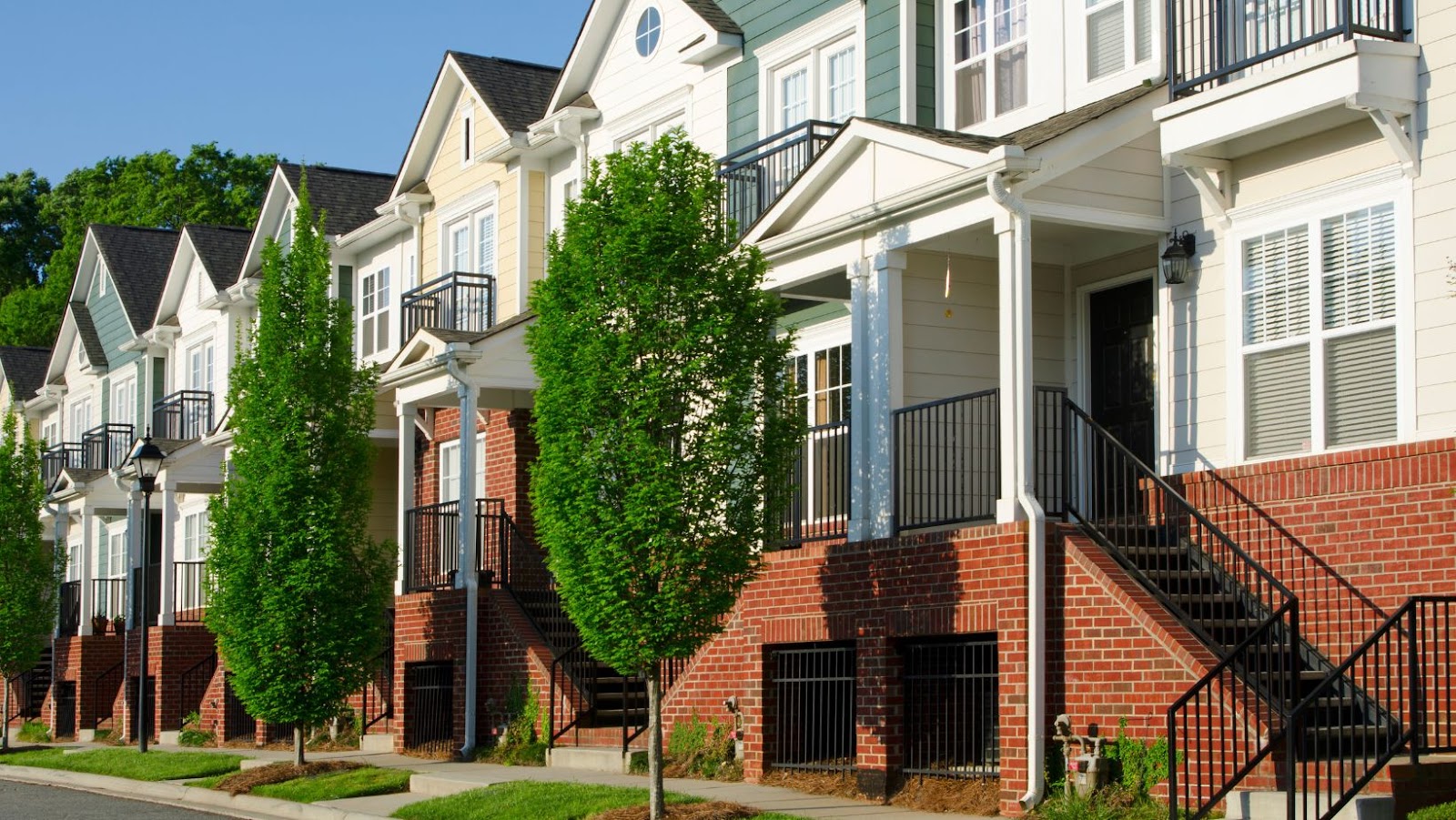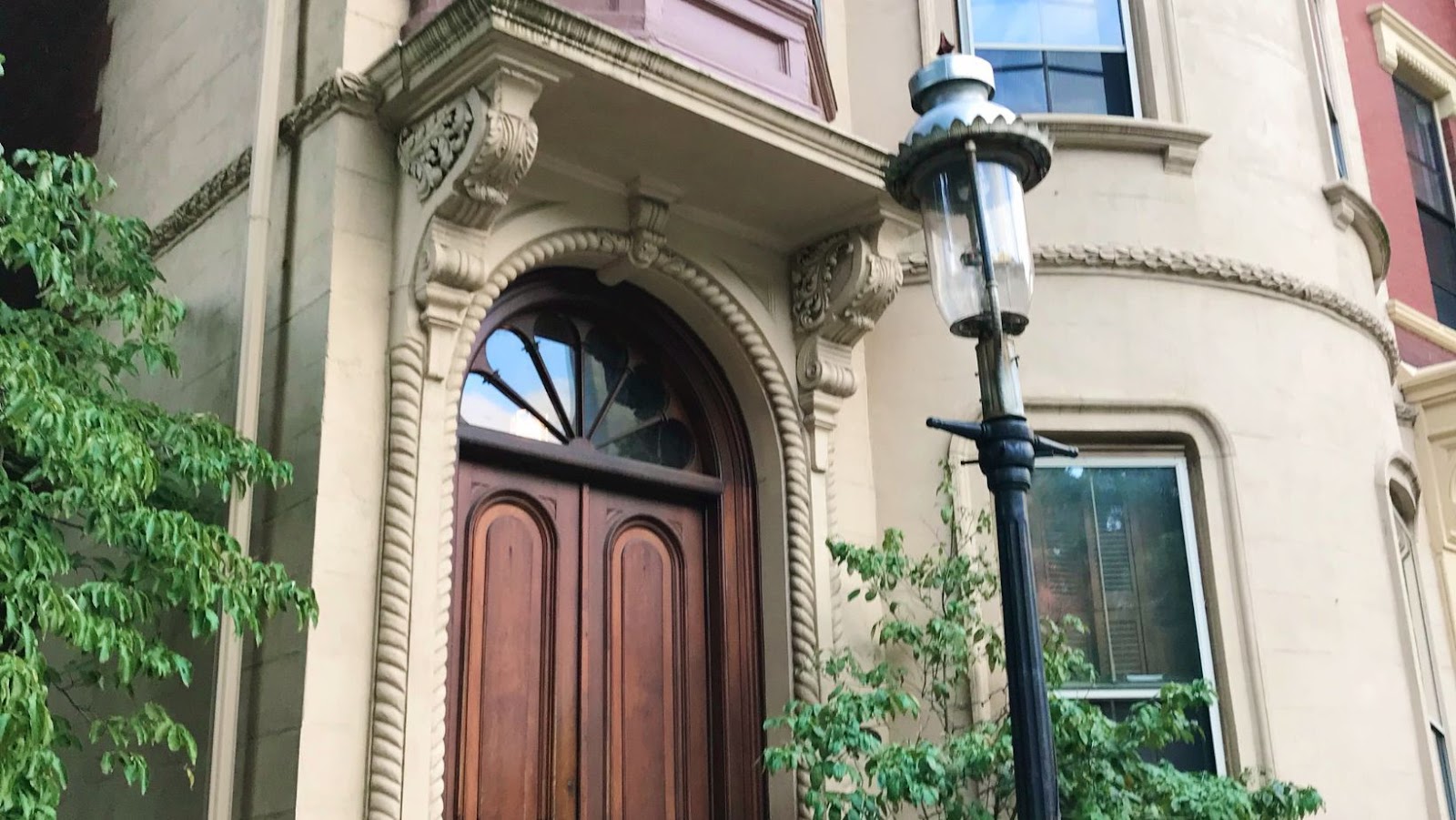
The main difference between townhomes and condos is the location of the residence. Townhomes are often found in suburban areas and are usually part of a planned community. Condos, on the other hand, are usually located in urban centers and are part of existing apartment complexes. This difference in location often impacts the size of the residences, the amenities available, and the cost of living.
Let’s explore the location differences in more detail:
Townhomes are usually located in a residential area
Townhomes are usually found in residential areas, such as neighborhoods with sidewalks or plenty of trees around. The construction of a townhome is essentially the building of a connected set of homes, with shared walls similar to those used in apartment buildings. Townhomes will often be arranged at angles along streets and in cul-de-sacs and are generally considered the more traditional style of residential living.
Townhomes may be part of a homeowners association (HOA) which provides management and generally oversee maintenance services for the residents. The homeowner typically pays monthly dues to take advantage of these amenities including landscaping, snow removal, exterior maintenance services and more.
In contrast, condos are normally located in urban areas such as near busy streets or commercial complexes. Condos can often provide great amenities like swimming pools, spas and fitness centers within their own complex and may even include their own retail stores on the premises for shopping convenience. Condos are often priced at lower costs than townhomes due to their centralized location having easy access to items like public transportation and entertainment alternatives that townhomes may lack.
The main differences between townhomes and condos is largely found through their locations – urban areas or residential settings – as well as their ownership rights, rules or regulations with which they operate on a local level.
Condos are usually located in a more urban area
Condos are often located in busy, urban areas, with easy access to shopping, dining, entertainment and more. This makes them an ideal choice for those looking to explore a new city or take advantage of the vibrant nightlife. Plus, they offer the convenience of living in a large building that is already designed and established.
Townhomes, on the other hand, are usually located in suburban or rural areas with typically less hustle and bustle than condos. They tend to be privy to quieter streets and larger yards compared to their urban counterparts and also often feature attractive architectural details such as stately columns or bay windows. Townhomes also often have their own private entrances giving them a little more independence from other dwellings within their community.
What is the difference between a townhome and a condo
The first main difference between townhomes and condos is ownership. With a townhome, you own the entire house, including the land it is on. This gives you a great deal of privacy and the ability to make changes to the property as you please. In contrast, condos are owned by an association, and each condo owner is only responsible for their unit and its upkeep. This also gives you greater control over the use of your space and how it is maintained.
Townhomes are typically owned by one person
Townhomes, also known as townhouses, are attached dwellings that are owned by one person or entity. Townhomes typically have several stories along with shared walls, which makes them similar to a single-family home. Townhomes provide more space and often offer outdoor living areas such as patios and balconies which make them an attractive option for homeowners who want more control of their living space and the ability to customize their environment.
Townhome owners typically have the sole ownership of their property, although there is some common ownership when referring to shared amenities such as recreation centers, pools or other facilities. Townhome owners are responsible for all costs associated with the upkeep of their dwelling including utilities and necessary repairs. They’re also responsible for paying taxes on their respective units and any dues related to amenities shared among townhouse owners in the same community.
Although some condominiums are attached dwellings that provide numerous comforts in additional living space, they’re fundamentally different from townhomes due to legalities surrounding common ownership among condo owners. Whereas townhomes generally have one owner with full responsibility for upkeep and maintenance of his/her individual unit within a cluster of homes, condominium owners share joint responsibility with other owners in a multi-owner development model operating under the umbrella of an Home Owner Association (HOA).
Condos are typically owned by a group of people or a corporation
When it comes to ownership, condos are typically owned by a group of people or a corporation. This ownership is known as “condominium association” and the Corporation legally owns the entire building and common areas on behalf of all the unit owners. Each owner is then given an individual deed for their own unit, granting them exclusive ownership.
Condos are run by a Board of Directors that usually consists of members who live in the building or complex. This Board is responsible for making decisions on behalf of all unit owners, such as:
- Making repairs to common areas
- Determining rules surrounding parking and other amenities
- Setting up an external maintenance committee
- Handling matters surrounding safety and security in the condos.
In contrast, townhomes are typically owned by individuals or families who hold exclusive title over their land and buildings. These individuals are responsible for making all necessary repairs, taking care of landscaping work and paying any taxes related to their property individually – no involvement from a shared organization needed!
Maintenance
One of the main differences between townhomes and condos is the maintenance factor. Generally speaking, condos have an association that takes care of all exterior maintenance such as lawn care, snow removal, and repairs. Townhomes, on the other hand, usually will have the owners responsible for all exterior maintenance such as lawn care, snow removal, and repairs.
Let’s take a more detailed look into the differences in maintenance between townhomes and condos:

Townhomes typically require more maintenance
Townhomes and condos may often look similar from the outside, however, there is a great difference in terms of ownership and maintenance for each type of property. One difference that is especially noteworthy when comparing Townhomes and Condos, is the amount of maintenance required for each type of residence.
When looking to purchase a townhome as an owner, you must be prepared to take on much more responsibility than with a condo or any other rental property. With townhomes, you are usually responsible for any exterior repairs or damage that occurs. This could include the roofing, siding, lawns; even basic landscaping. Your level of responsibility may differ depending on where you live and your particular building regulations; therefore it’s important to thoroughly research your homeowner association (HOA) regulations before purchasing a townhome.
Typically with condominiums/apartment buildings, most (if not all) general maintenance will be managed by the building’s HOA organization alongside dues paid by owners. The HOA will also generally manage repairs within individual units such as plumbing and electrical system concerns. If a condo unit owner needs help from an outside company (such as exterminator) they must take into account their own budget for these services opposed to having the HOA cover it all like it does with townhouse owners’ payments – making them less cost-efficient than condos in terms of upkeep/maintenance costs over time.
Condos typically require less maintenance
Generally, when comparing a townhouse versus a condo lifestyle, residences of condos may find that they require less maintenance. Condo fees are typically higher than those of townhouses as they cover a variety of services and amenities not applicable to townhouse ownership. These services typically include:
- Recurring cleaning and landscaping
- Outside window washing
- Regular inspections and minor repairs
- Money for insurance coverage
- Other common area items such as elevators
All the costs from these facilities are covered by the monthly fee assessed to those living within the condo complex. In addition, since condo associations form boards of directors with voting rights for their members and existing by-laws governing membership rights and responsibilities, most major decisions related to upkeep or facility access must be voted upon collectively by the board before any changes are implemented.
Another big advantage when it comes to maintenance on condominiums is that since repairs need to be approved by boards of directors in advance, homeowner’s personal infrastructure commitments can be kept at a minimum or even avoided entirely as required repairs are usually in shared responsibility between all members of the association. As such, roof repair or repaving projects are much easier managed under collective agreement rather than having homeowners manage them independently and at their own expense.
Cost
One of the main differences between a townhome and a condo is cost. Townhomes typically have a higher price point than condos due to size, amenities, and additional features such as private yards and parking. Furthermore, townhomes often come with higher taxes and maintenance fees, making them more expensive overall than condos.
Let’s take a closer look at the other differences between these two types of properties:
Townhomes typically cost more than condos
When it comes to the cost of a townhome or condo, townhomes typically come with a higher costs. This is mainly because most townhomes are detached, meaning that the owner will have all the responsibility for up-keep, property taxes and repairs. Whereas condos are typically part of an attached building in which part of the costs are shared among all of the owners. That being said, not all townhomes come with higher costs than condos. It’s important to budget and research your options ahead of time to make sure you know what you can afford.
Townhomes tend to have higher prices per square foot on average compared to condos due to difference in size and amenities as well as location and other factors like age and condition of a unit (new construction often commands higher prices). Condos generally require lower initial financial outlay than townhouses since they usually include various common area amenities (like swimming pools, fitness centers, parking lots etc.) in their monthly maintenance fees. In addition, condos may have additional features such as gated entries or secure parking lots that could increase their overall cost. On the other hand, some condo fees may include items like water/sewer/garbage which may reduce overall monthly expenses for condo buyers.

Condos typically cost less than townhomes
When evaluating the costs associated with buying a home, townhomes and condos have some significant differences. One key aspect to consider is the overall cost associated with purchasing either type of property. Generally speaking, condos tend to be less expensive than townhomes. This is because condos are typically smaller in size and can often be purchased in more desirable locations at a lower cost. That’s not to say that all condos are cheaper than all townhomes—there are exceptions to this rule depending on location and size—but it does indicate that it is possible to purchase a condo at a lower price point than a comparable townhome.
In most cases, when you purchase a condo you only own the living space within your walls and any amenities provided as part of the building complex (pools, gyms, etc.). Whereas when you purchase a townhome you own more of the structure itself along with control over what can and cannot take place in your own private building (i.e., renovations or exterior modifications). That greater independence—aside from the inherent pride in ownership—also comes with added maintenance costs that might not be applicable if you were renting or leasing the property instead of buying it outright. As such these additional costs should also be factored into an accurate cost analysis of both options before making a purchase decision.
Amenities
When looking at the differences between townhomes and condos, one of the main things to consider is amenities. Townhomes typically have their own individual amenities such as a private backyard, balcony, or deck. They may also have a single family living room and dining room combination. On the other hand, condos often have amenities that are shared with other condo owners in the building such as a pool, gym, or community room. However, both townhomes and condos can offer great amenities that are attractive to potential buyers.
Let’s take a closer look at the amenities of townhomes and condos:
- Townhomes – private backyard, balcony, deck, single family living room and dining room combination.
- Condos – pool, gym, community room.
Townhomes typically have fewer amenities
Townhomes and condos are both multi-unit residential dwellings, but they offer different living experiences. One of the main differences between them is the shared amenities. Townhomes typically have fewer amenities than a traditional condominium building, making them more economical for budget-minded buyers.
In a townhome community, owners may have access to amenities such as shared lawns or swimming pools, or even a small park for residents to enjoy in their free time. However, these amenities are often limited compared to larger condominium structures which may feature gyms, clubhouses and other recreational facilities.
For those who prefer to live in a self-contained community and don’t need access to extensive additional services or recreational options, townhomes can provide an ideal living arrangement. On the other hand, those seeking full access to all of the typical benefits of condo living should consider getting their own place in a traditional condominium building rather than a townhome complex.
Condos typically have more amenities
Condos, like townhomes, can come in various sizes in both urban and suburban locations. When it comes to amenities, however, condos typically have more than townhomes. Though not all condos or townhomes offer the same amenities – each one is unique – many condos provide onsite amenities like pools, spas, saunas, gyms, playgrounds, tennis or basketball courts and even a private dog park. Other condos may include security features such as gated entries and magnetic cards for entry with complex-wide surveillance systems.
Most importantly, condominium living often offers you more freedom since you don’t have to worry about maintaining things like gardens or lawns that a townhome requires. Though these are great features that can make condo-living comfortable and secure, they also usually carry with them an additional cost of a higher monthly maintenance fee depending on the association. People who choose to live in condos also get access to exclusive clubs and join community events/activities as well as take advantage of special discounts offered by partner businesses within the area that could help save costs on utilities or leisure activities.



